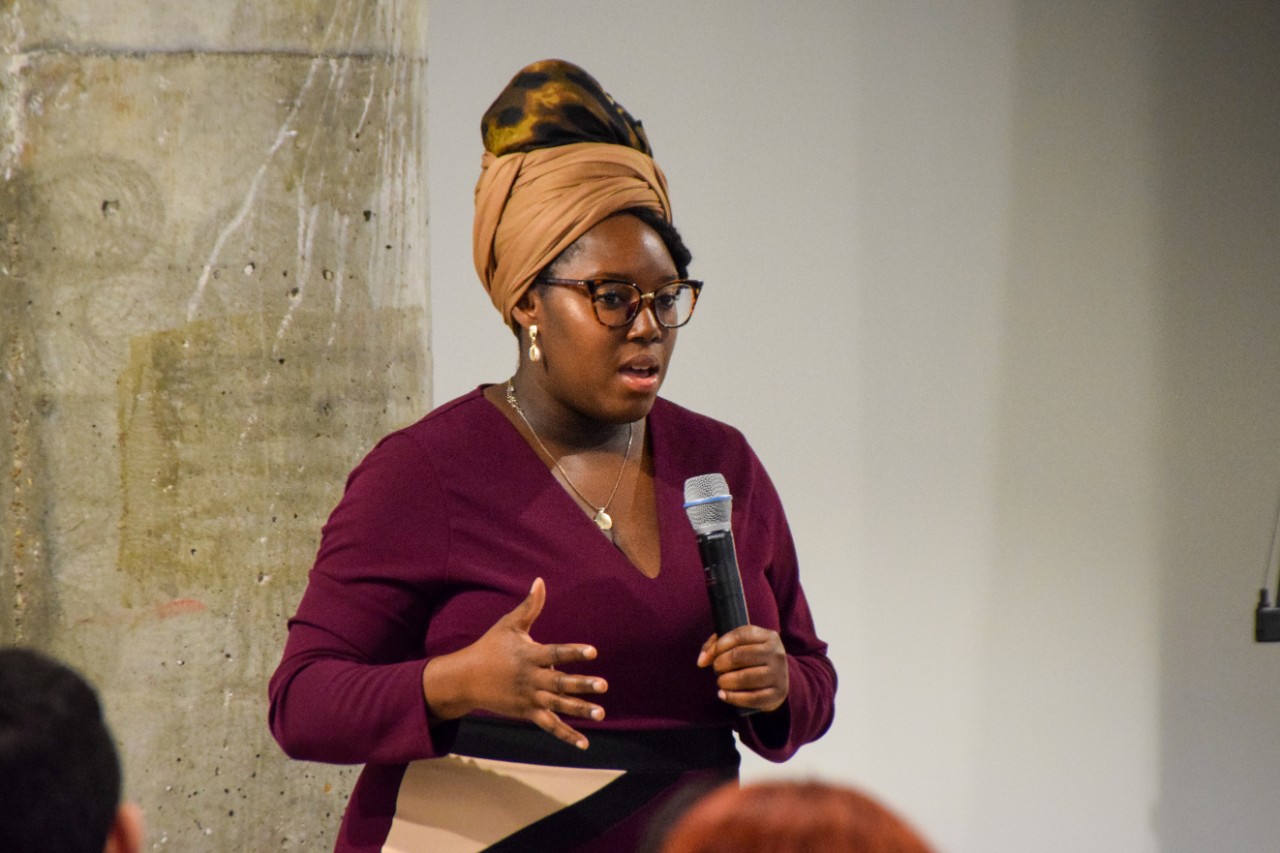Student Spotlight: Brittney Miles
Written by Chris Pasion, graduate assistant to The Graduate School.

Brittney Miles is making sure that black girls are seen most clearly. They have a story to tell, and she is providing them the platform to be heard. Brittney is a PhD student in sociology whose research investigates the ways that schools and society fail young black girls in the Cincinnati area. She partners with a local youth organization to lead focus groups that allow these girls to share their experiences and reflect on them in a safe space.
Schools have historically been a place of racial contention, with school discipline being heavily weighted towards those with darker complexion. Over the last decade, there has been a flux of videos posted to the internet that show school discipline at its ugliest, as resource officers put kids in handcuffs, choke holds, and even body slams as a form of control. Brittney says that the girls she speaks with consume these videos and “understand that this is not okay. They see police violence in their neighborhoods, they see it on TV, they really grew up with Black Lives Matter as rhetoric that they were a part of and that mattered to them.” This is a social problem that Brittney is hoping to tackle by giving these students a voice to express their perspective.
Brittney was surprised by what she heard from these girls. During the focus groups she conducted, where she met with students from 7thto 11thgrade, Brittney says that “I expected them to say, ‘All my teachers are racist, it’s not fair,’ but no, they didn’t say that. They had so much more nuance than I gave them credit for.” The girls spoke openly about mental health issues, identity, body politics, gender, and more. It was an entirely differently story than was displayed in the data and how society understands school discipline as a problem. “When I really listened to these girls and saw them fully and how they understand the world, it required deeper compassion and new eyes.”

Brittney wasn’t immediately able to get the girls to open up with her. It took time and a lot of vulnerability on her end to get them to trust her and believe that what she was doing was well-intentioned. “They were happy to tell their stories, but they knew how valuable their stories are, so they were really selective about what they would tell and at what time they would reveal things to me,” she says. “I think that speaks to their power of discernment, but also their real learned caution that they have about how we parade people around and tell their most vulnerable stories.” She recalls speaking with an 8thgrader with aspirations of being a nurse, a student who was failed by a teacher who perceived her to be a bad student. This student began to doubt her self-worth because of this and started to believe that her nursing aspirations were in vain. Unfortunately, this is likely just one version of a story that Brittney has heard many times throughout her focus groups. She has decided that the best way to further answer these problems is to talk about them on a wider scale, to take her focus groups conversations and add them to a much larger dialogue.
In addition to an upcoming book chapter on her research and publication with her undergraduate research assistant, Brittney was the winner of this year’s Three Minute Thesis competition. Her presentation, accompanied by a striking PowerPoint slide of a resolute statue, allowed her to place her research alongside presentations on medicine, physical science, and design, and show it to a wide audience. She won because her story is easy to grasp, especially when conveyed with the passion and clear investment that she presented it with. “Everybody knows what a school is, everybody knows what a black girl is, and everybody – I hope – wants to be a better person in the way they move through the world. That’s it! This is not something that I’ve got to try to get you to wrap your head around, this is accessible.”

Brittney’s work is far from over. “As a person who is so emotionally driven by my work, it’s hard for me to separate myself out. I do what the work calls me to do.” Brittney’s lived experience is not unlike that of the students she interviews. Their stories of body policing or being harassed by teachers made her reflect on her own story and how this systemic problem has now been passed down to a new generation of students. She hopes to continue searching for answers to these complex societal problems, all while ensuring that the girls she works with feel heard, accepted, and valued. The work is calling her to keep investigating school discipline in the area and figuring out what it means to be a black girl living in Cincinnati today. School discipline and inequality exist across the board, but Brittney plans to continue centering her research in Cincinnati to see the girls here most clearly and find ways to better tell their stories and perspectives. “All of it becomes part of how we say, ‘What are your needs?’” she says. “It shapes how I ask questions, but more importantly it shapes how I tell the stories afterwards, because it all matters.”